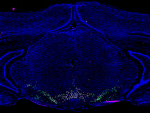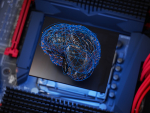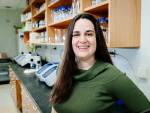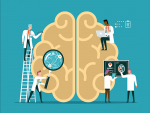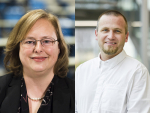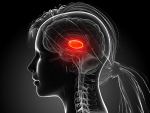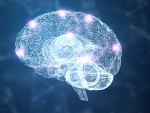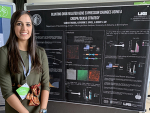Displaying items by tag: department of neurobiology
The distinct cell populations were identified by single-nucleus RNA sequencing of 21,600 cells of the rat ventral tegmental area, located in the midbrain.
Tagged under
The fields of neuroengineering and brain-computer interfaces could have a tremendous impact on a number of neurologic conditions, such as stroke, neurodegenerative disorders, Parkinson’s disease, dementia and other brain diseases.
Tagged under
Newly funded research by the McKnight Foundation will study whether genetic links contribute to addiction and relapse.
Tagged under
Tagged under
- release
- advancement
- office of the president
- office of the provost for student and faculty success
- department of anesthesiology and perioperative medicine
- department of neurology
- department of biochemistry and molecular genetics
- department of cell developmental and integrative biology
- department of clinical and diagnostic sciences
- department of dermatology
- department of emergency medicine
- department of family and community medicine
- department of genetics
- department of medical education
- department of medicine
- department of microbiology
- department of neurobiology
- department of neurosurgery
- department of obstetrics and gynecology
- department of ophthalmology and visual sciences
- department of orthopaedic surgery
- department of otolaryngology
- department of pathology
- department of pediatrics
- department of pharmacology and toxicology
- department of physical medicine and rehabilitation
- department of psychiatry and behavioral neurobiology
- department of radiation oncology
- department of radiology
- department of surgery
- division of academic general pediatrics
- division of acute care surgery
- division of adolescent medicine
- division of advanced medical imaging
- division of anatomic pathology
- division of cardiothoracic surgery
- division of cardiothoracic anesthesia
- division of child abuse pediatrics
- division of clinical immunology and rheumatology
- division of community anesthesia
- division of diagnostic radiology
- division of developmental and behavioral pediatrics
- division of forensic pathology
- division of gastroenterology and hepatology
- division of gastrointestinal surgery
- division of general internal medicine
- division of general pediatrics and adolescent medicine
- division of genomics and bioinformatics
- division of gerontology geriatrics and palliative care
- division of gynecologic oncology
- division of hematology and oncology
- division of infectious diseases
- division of informatics
- division of laboratory medicine
- division of maternal fetal medicine
- division of molecular and translational biomedicine
- division of molecular imaging and therapeutics
- division of multispecialty anesthesia
- division of neonatology
- division of nephrology
- division of neuro oncology
- division of neuropathology
- division of pain medicine
- division of pediatric allergy and immunology
- division of pediatric hematology oncology
- division of pediatric cardiology
- division of pediatric critical care medicine
- division of pediatric dermatology
- division of pediatric emergency medicine
- division of pediatric endocrinology
- division of pediatric gastroenterology
- division of pediatric hospital medicine
- division of pediatric infectious diseases
- division of pediatric nephrology
- division of pediatric neurology
- division of pediatric oncology
- division of pediatric optometry
- division of pediatric pulmonary and sleep medicine
- division of pediatric rehabilitation medicine
- division of pediatric rheumatology
- division of pediatric surgery
- division of plastic surgery
- division of preventive medicine
- division of pulmonary allergy and critical care medicine
- division of reproductive endocrinology and infertility
- division of surgical oncology
- division of transplantation
- division of vascular surgery and endovascular therapy
- 1917 clinic
- acute care for elders unit
- addiction recovery program
- addiction recovery scholars
- alabama genomic health initiative
- all of us research program
- autism spectrum disorders clinic at uab
- center for addiction and pain prevention and intervention
- center for aids research
- center for clinical and translational science
- center for emerging drug discovery
- center for exercise medicine
- center for free radical biology
- center for interprofessional education and simulation
- center for genomic medicine
- center for low vision rehabilitation
- center for metabolic bone disease
- center for neurodegeneration and experimental therapeutics
- center for outcomes and effectiveness research and education
- center for palliative and supportive care
- center for pediatric onset demyelinating disease
- civitan international neuroimaging laboratory
- civitan international research center
- civitan sparks clinics
- comprehensive arthritis musculoskeletal and autoimmunity center
- comprehensive cardiovascular center
- comprehensive center for healthy aging
- comprehensive diabetes center
- comprehensive neuroscience center
- comprehensive stroke center
- comprehensive transplant institute
- deep south resource center for minority aging research
- gregory fleming james cystic fibrosis research center
- epilepsy center
- heflin center for genomic sciences
- hepatorenal fibrocystic diseases core center
- informatics institute
- institute for cancer outcomes and survivorship
- legacy of hope
- liver center
- lung health center
- mcknight brain institute
- minority health and health equity research center
- mucosal hiv and immunobiology center
- multiple sclerosis center
- national spinal cord injury statistical center
- nephrology research and training center
- obesity health disparities research center
- obrien center for acute kidney injury research
- pancreatobiliary disease center
- parkinsons disease information and referral center
- pediatric pulmonary center
- precision medicine institute
- primary care research collaborative
- spain rehabilitation center
- school of medicine
Only 22 early-career researchers were selected as Pew Scholars this year, and Thyme is one of five whose research focus is the brain.
Tagged under
Tyler Huang graduates from UAB with a Bachelor of Science degree in neuroscience and a Master of Science degree in multidisciplinary biomedical sciences with a concentration in neuroscience. He is part of one of the first cohorts finishing an Accelerated Bachelor’s to Master’s.
Tagged under
Preserving brain health in an aging population is a growing concern in the United States. An estimated one in five Americans 65 years and older has mild cognitive impairment, and one in seven has dementia.
Tagged under
The list was made by a group that aspires to bolster and increase diversity across all scientific fields, promote retention through the “leaky academic pipeline,” and broaden academic and industrial awareness of diversity and inclusion.
Tagged under
- release
- neuroscience
- school of medicine
- school of public health
- college of arts and sciences
- department of chemistry
- department of neurology
- department of medicine
- department of epidemiology
- department of psychology
- department of microbiology
- department of neurobiology
- department of physics
- division of endocrinology diabetes and metabolism
- division of hematology and oncology
- comprehensive neuroscience center
- oneal comprehensive cancer center
Dustin Fast plans to incorporate artificial intelligence and machine learning in his efforts to build better eye-activation software as he enrolls in UAB’s neuroengineering doctoral program.
Tagged under
Tuscher is one of what the foundation calls “150 of the world’s most promising young scientists” doing groundbreaking neurobiological research.
Tagged under
Gavin will oversee program management of the established undergraduate programs in neuroscience, genetics and genomic sciences, bioinformatics and more.
Tagged under
Tagged under
UAB’s Center for Addiction and Pain Prevention and Intervention will conduct research that can be developed and translated into better treatments for addiction and pain.
Tagged under
- release
- school of medicine
- department of medicine
- division of infectious diseases
- department of psychiatry and behavioral neurobiology
- department of psychology
- department of neurobiology
- department of health behavior
- school of public health
- division of preventive medicine
- department of anesthesiology and perioperative medicine
- college of arts and sciences
Vladimir Parpura, M.D., Ph.D., professor in the Department of Neurobiology has been selected as a fellow of the American Physiological Society.
Tagged under
This research offers fundamental insights about sensory thalamic subnetworks and will enable powerful new strategies to probe behavioral and perceptual functions of these distinct circuits.
Tagged under
This work is a step forward in understanding early molecular changes that influence the development of addiction, and may have application to the role of similar gene programs that mediate other types of behavior, memory formation or neuropsychiatric disorders.
Tagged under
A mouse model and previous studies suggest that genetic intervention in SHANK3-related ASD may be most effective earlier in development.
Tagged under
The guide is unique in having separate, and extensive, basic versus clinical neuroscience sections, which support each other.
Tagged under
Two UAB neuroscientists have been included in a listing of 100 of the most inspiring black scientists in the nation.
Tagged under
“Attending the World Congress on Undergraduate Research … was the highlight of my college career.” – Saakshi Thukral
Tagged under
